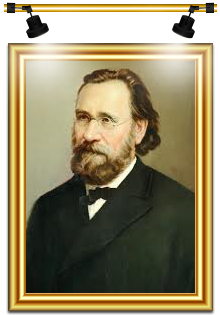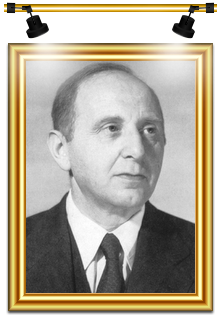-
 Ilya Mechnikov(1845–1916)
Ilya Mechnikov(1845–1916)An outstanding physiologist, embryologist, Nobel Prize laureate in physiology and medicine, Doctor Honoris Causa of Kharkiv Imperial University, Ilya Mechnikov was born in Kharkiv province (Ivanovka village) in a noble family, studied in Kharkiv Gymnasium No. 2 and at the Department of Natural Sciences of the School of Physics and Mathematics of the University of Kharkiv.
The Ukrainian scientist is one of the fathers of evolutionary embryology, immunology and microbiology, founder of scientific gerontology and comparative inflammation pathology, discoverer of phagocytosis. He is credited with developing the theory of germinal layers (blastophyllums), the theory of the origin of multicellular organisms, the phagocytic theory of the immune system. The scientist was awarded the Nobel Prize in Physics and Medicine for his great scientific achievements. -
 Lev Landau(1908–1968)
Lev Landau(1908–1968)This prominent Soviet physicist-theorist was born in Baku in the family of a petroleum engineer. At the age of 14 Lev Landau entered Kirov Azerbaijan State University (Baku State University) where he studied simultaneously at two Schools: School of Physics and Mathematics and School of Chemistry.
The scientific path of the genius scientist is closely connected with the history of Kharkiv physics: Lev Landau headed the Department of General Physics of Kharkiv University. He was the first to reveal the nature of diamagnetism in metal. He was among the founders of the theory of superconductivity. Moreover his scientific interests covered quantum mechanics, solid-state physics, cosmic-ray physics, hydrodynamics, physical kinetics, theories of phase transitions and superfluidity of fluids. The scientist made a number of discoveries while studying those. Lev Landau was awarded the Nobel Prize in Physics “for his pioneering theories for condensed matter, especially liquid helium”. -
 Simon Kuznets(1901–1985)
Simon Kuznets(1901–1985)This famous economist was born in Kharkiv, graduated from the School of Law of Kharkiv University, in 1922 Simon Kuznets emigrated to the USA where he continued his research.
His scientific interests covered economic and statistical research in investment dynamics, field-specific and technological structures of investments, investment accumulation evolution in the USA and other countries. His work on calculation of national income is considered to be the greatest contribution to the science of economics. He was the first scholar to study economic fluctuations and long-term economic growth. Simon Kuznets became the father of the theory of building cycles, i. e. fluctuations with intervals of 18–25 years associated with periodic mass accommodation renewal by the new generation. The scholar was awarded the Nobel Prize in Economics “for his empirically founded interpretation of economic growth which has led to new and deepened insight into the economic and social structure and process of development”.

